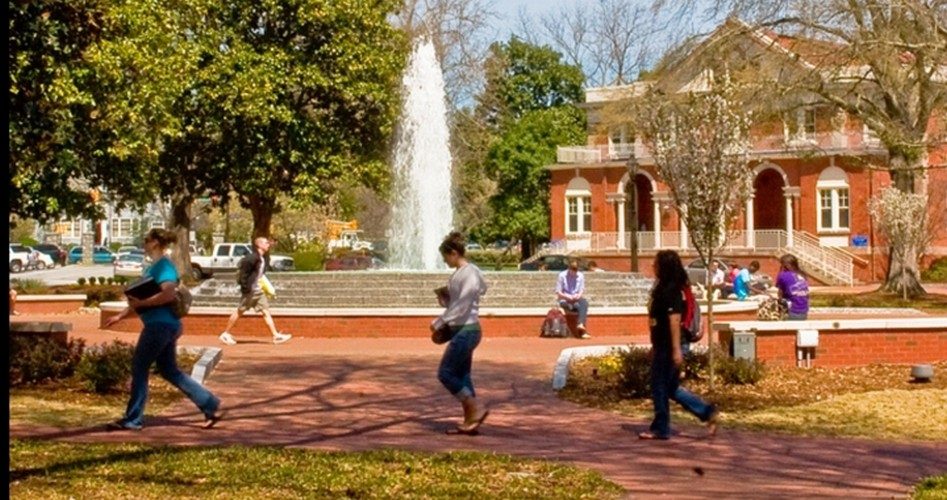
First Amendment rights remained intact at the East Carolina University, much to the delight of religious graduates. Graduating students had been instructed by a chemistry professor that they could not mention God during a departmental graduation ceremony, but university officials have ultimately told students to disregard those instructions.
Assistant Professor Eli Hvastkovs of the ECU Department of Chemistry sent a May 1 e-mail to his students asking them to prepare “family friendly” statements for the chemistry department’s recognition event. Students are encouraged to provide voluntary personal statements for the ceremony wherein they can give their thanks to loved ones or describe their plans for the future.
In his e-mail, he specifically said that they students should not mention God.
The e-mail reads, “I’ve had some submissions that needed to be edited. [sic] so here are some guidelines.” The first guideline states, “You can’t thank God. I’m sorry about this — and I don’t want to have to outline the reasons why.”
During an interview with Campus Reform, Hvastkovs defended his e-mail by stating that too many students had recognized religious figures during last year’s ceremony.
“It’s not a religious ceremony,” he contends. “It’s purely educational.”
Hvastkovs admitted that his instructions did not represent school policy, but rather a departmental one.
School officials, however, did not recognize or approve of the distinction. ECU Executive Director of Communications Mary Schulken told Campus Reform that “the First Amendment allows them to thank God, to thank any force or any individual that they so desire.”
Provost Marilyn Sheerer also sent an e-mail to students telling them that they may dismiss Hvastkov’s guidelines:
Please disregard Dr. Hvastkovs’s previous email regarding your departmental graduation statement he sent to you on May 1, 2014. I have confirmed with the Chair of the Department of Chemistry that students may submit personal statements, up to 35 words, to be read during the departmental ceremony.
These statements can be your personal expressions and as such the University will only limit these expressions, as permitted by applicable First Amendment law.
Examples of the type of information that may be restricted were provided in the e-mail, including things such as hate speech and speech that may be “seriously disruptive to the campus,” as in “interrupting classes or exams, inciting a riot,” etc.
The e-mail concludes, “Religious references of any type will not be restricted. I regret that, without approval from the appropriate University officials, any other limitations were communicated to you.”
ECU also released a statement on Tuesday, echoing the sentiments in the provost’s e-mail:
We believe by allowing the students to submit a personal statement for reading during a departmental graduation ceremony, the university creates a forum for student expression. As such, the university regrets that, without approval from the appropriate university officials, other limitations and instructions were communicated to participating students in one department.
We have taken immediate and deliberate steps to notify students of the legally permissible constraints associated with these solicited, voluntary personal statements. Those steps include a follow up email to students from our provost clarifying the constraints and clarifying that there are not constraints on religious references.
Deans and department chairs have received a reminder of our policies and practices with regards to voluntary personal statements. In addition, we will use this incident in a intentional way to heighten awareness and understanding of our practices within the university.
While the students at ECU were spared from religious suppression at the hands of their Chemistry professor, more stories like this may appear as the 2014 graduation season approaches.
Still, free speech will prevail so long as people are not willing to give up the fight.
In South Carolina last year, for example, the Pickens County School District board had banned Christian prayers at public gatherings, including school graduations.
Roy Costner IV, valedictorian of Liberty High School, in spite of the policy, ripped up a copy of his pre-approved speech shortly after he approached the podium at Clemson’s Littlejohn Coliseum.
“I’m so thankful that both my parents led me to the Lord at a young age,” he told the crowd. “And I think most of you will understand when I say: Our Father who art in Heaven, hallowed be Thy name.”
His actions provoked boisterous applause from the crowd.
Likewise, a student at Lincoln County High School in Kentucky drew a standing ovation after including a prayer in his graduation speech last year.
Jonathan Hardwick asked attendees if they’d like to participate in prayer and thanked the Lord for His “many blessings.” He closed by saying, “Will You watch over and us and bless this ceremony?”
The school’s principal, Tim Godbey, had been approached by six students last year who asked that any graduation prayers be banned. Godbey responded by stating that the United States Constitution protects student speech, which includes prayers.
Photo of East Carolina University campus



